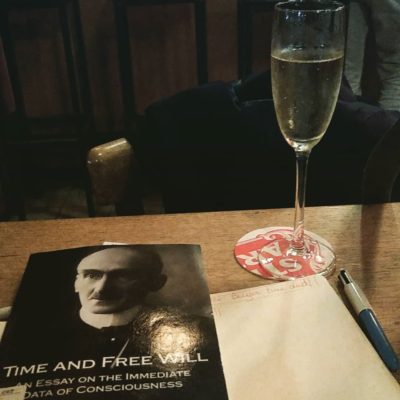In “Meeting the Universe Halfway” Karen Barad connects quantum mechanics to the ideas in continental and feminist traditions. She so creates a reference work in new materialism, specifically referencing Bohr’s views on the interpretation of quantum mechanics. What we (with philosophical, ethical, cognitive science and history of physics backgrounds) wonder is whether this affords to bridge the gap that people with an ‘exact-scientific’ worldview, or with an ‘analytic mindset’, often experience with respect to work in continental philosophy. A gap that has less to do with the conclusions on diversity and the importance of reports of lived experience as with the way it is phrased in this tradition. The way we approach this is to try to read chronologically on the debates between quantitative science and experience, or qualitative, data. As a starting point, Rob Sips proposed reading of Bergson’s “Time and Free Will” essay. As an endpoint we fix on reading of Karen Barad’s “Meeting the Universe Halfway”. In between we will see plot a course over the Einstein-Bergson debate and over the various interpretations of quantum mechanics of Bohr and Whitehead.
Below is the read-out of the first session discussing Bergson’s “Time and Free Will”.
Our discussion centered on reconstructing Bergson’s argument from the conclusion of the essay. This conclusion summarizes the argument well. We summarize our discussion with reference to the graphical reconstruction below.
On top you see Bergson’s conception of time (as durée-duration) as a matter of immediate experience. He likens it to the experience of a melody, an experience which defies it being quantified. Below (in blue) you see how, according to Bergson, any quantification of it, as a score with distinct notes, leads to a notion of time which is inevitably spatialized. This way, for Bergson the way psycho-physicalism proceeds, the original experience of time is lost.
He indicates (green box) that what we talk about in commonsense language is necessarily a compromise between the melody and the score view. In order to talk about the world we need to quantify our experience and this quantification reverberates in how we experience the world qualitatively. That said, the durée-time and spacetime are presented as two very distinct ways of looking at the world. The former is characterized as ‘intensional’ (based on the experience of intensities) with subjective experience being matter of heterogeneity and multiplicity. The latter is characterized as ‘extensional’ (based on measurements) with the notion of objective things introducing homogeneity and simultaneity.
Science in this sense makes everything the same and also happen at the same time since scientific laws explicitly reduce away our experience of time (this is where the debate with Einstein engaged which will be one of our next steps of reading). What we lose in so doing as the English title of the essay states is not only a sense of time as durée but with it also our ability to make sense of ‘free will’. Bergson specifically takes care to position this in the tradition of Kant. He says that this loss of free will and time is a consequence of the spatial analysis in “The Critique of Pure Reason” and that Kant tried to remedy this loss by putting the mysterious concept of ‘thing-in-itself’ central to “The Critique of Practical Reason”. The problem is according to Bergson avoided by seeing the irreducibility (as well as originality) of time-durée; by seeing that our experience is as factual as what we can measure. In this way we can keep our moral outlook without the need for mysterious unobservable entities. We just need to realize that reducing science to the extensional and exact is sidelining not only a lot of facts but the most basic, and immediate, facts of all.
So although ethics is not explicitly thematized, it certainly is, via the notion of free will, one of the background motives, if not motivations, for the essay. In the way the argument is set up it is explicitly linked to non-determination of ‘time-durée’ by ‘spacetime’ considerations.
In our discussion we agreed that there was something valuable in recognizing a qualitative and experiential component as an independent factual element for science. However, as is clear from the double red line and question marks we did not see how the strict division as drawn allowed for any scientific or commonsense or shared social combination of the two elements of Bergson’s analysis. We also didn’t see where the distinction was to be drawn. Should we look in our most individual experience or, as the word ‘conscience’ implies, look at how we can share experiences? Should we see all animals as having durée and look at the human animal as specific in its ability to spatialize aspects of experience? Answers are probably to be found in later works of Bergson but the questions are relevant to what was said above. Maybe Barad is right in seeing quantum mechanics as a way of integrating the two aspects via the principle of indeterminacy in the interpretation of Bohr? Maybe there is a link to enactive approaches where embodiment connects our experience to the world? Is a thinker like Whitehead able to bridge a gap between the mathematical and experiential? Can we trace the animalistic aspect of time as durée back to the way Deleuze describes a ‘becoming-animal’? Is an Einsteinian view of spacetime fully incompatible with free will.
This is what we’ll follow up on. In the meantime we all believe Bergson did succeed in the thing he set out to do: state that a fully reductionist psychophysicalism to paradoxes are a new kind of Zeno-paradoxes. It also resonates with us that when we see others, e.g. those with a diagnosis of mental illness, as completely determined by their diagnosis we do take something essential away from them: their free will. In seeing them as determined by their illness we see them as automata.
